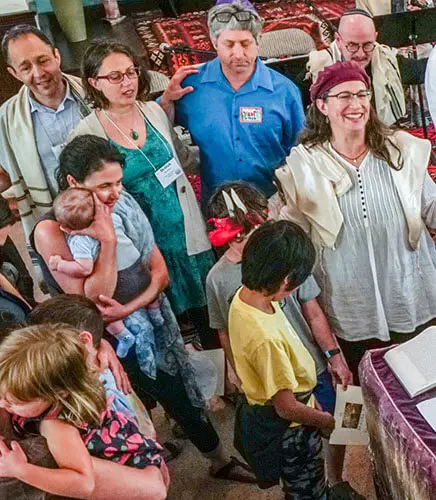
Talk to the Ancestors
Returning Home in the Month of Elul
Tuesdays | 7 – 8:30pm
August 10, 17, 24, 31
On Zoom
Tickets
Chochmat Members – $5
General Public – $10
As we prepare to come back into our community, physically, we must also recognize and give space for our exploration of how this transition back can really be a transition forward. Luckily, our tradition offers us deep wisdom regarding the multi-relational world of community.
Each of the four sessions will begin with a conversation prompt from Pirkei Avot. We are entering the season of examining our own hearts, restoring relationships, and re-attuning with the Divine resonance that surrounds us, and perhaps these prompts will help us move toward a better iteration of ourselves. Join us as we begin to discuss, along with the Rabbis, the ways we can be fully and ethically present with ourselves, the Divine, and each other.
What is Pirkei Avot?
Pirkei Avot, or Sayings of the Ancestors, is part of the Mishnah, the Oral Torah, that eventually was written down to preserve its wisdom and reasoning processes. 62 of the 63 short books that make up the Mishnah are legal texts. Pirkei Avot is the exception.
Pirkei Avot transmits ethical advice and insights of the leading rabbinic scholars of different generations. Just like the written Torah, it invites us into the conversation about what it means to be Jewish. But, unlike the written Torah, we know exactly with whom we are conversing.
It begins with, “Moses received the Torah from Sinai and transmitted it to Joshua; Joshua to the elders; the elders to the prophets; and the prophets handed it down to the people of the Great Assembly.” And then what happens? Well, that is really up to us!
Lisa Strongin is a lawyer, congregational lay-leader, activist, community educator, and life-long learner.
Session One: Be Deliberate In Judgement
Moses received the Torah from Sinai and transmitted it to Joshua; and Joshua to the Elders; and the Elders to the Prophets; and the Prophets transmitted it to the People of the Great Assembly. They [the People of the Great Assembly] said three things: Be deliberate in judgment; develop many students; and make a fence for the Torah.
This is the first passage of Pirkei Avot presents to us the foundational document of Jewish ethics. It begins by establishing the Sages’ uninterrupted authority to teach and interpret back to the Sinaitic Moment— when the heavenly conception of the Jewish people as ideal become an earthly reality.
In true “cliff hanger” fashion, it opens the door for everything that Judaism becomes and will become. But there are 3 proscriptions as well. What purpose did they serve our ancestors? What is meant by Torah and why do we need to have a fence around it? What relevance, if any, do these words have for us as today’s inheritors of Torah?
Session Two: Acts of Boundless Generosity
Shimon the Just was among the survivors of the Great Assembly. He used to say: The world stands on three things— on Torah. on Divine service or God’s work, and acts of boundless generosity.
What about peace, love and understanding? Drugs, sex and rock and roll? Is this a “true” statement of fact or an aspirational statement of a world that could be possible if these 3 things were our underpinning values? As with many statements of “truth,” it is only true if we make it so. Can we/should we?
Session Three: Let the Awe of Heaven Be Upon You
Antigonus, leader of Socho, received [his Torah] from Shimon the Just. He used to say: “Don’t be like servants who serve their master for the sake of receiving a reward; instead be like servants who serve their master with the understanding that they will not receive a reward. And let the awe of heaven be upon you.”
A little history here: Antigonus was the head of the Sanhedrin around the beginning of the 2nd Temple. He is part of the priestly class and therefore, it is remarkable that the Rabbis chose to preserve his name and teaching. Seems like a good reason to explore this teaching further. Many of us reject the “master-servant” paradigm, yet there is something revolutionary and revelatory about this statement, isn’t there?
Session Four: Acquire a Friend
Y’hoshua ben P’rachyah and Matai of Arbel received [their Torah] from them. Y’hoshua ben P’rachyah says: Make a teacher for yourself; acquire a friend for yourself; and judge everyone favorably.
Is this a rabbinic solution to the existential crisis of human loneliness or a directive for self-transformation? Let’s share our opinions and see what the discussion opens for us as we prepare to intentionally re-engage with our community and embrace the support and challenges offered to each of us.


